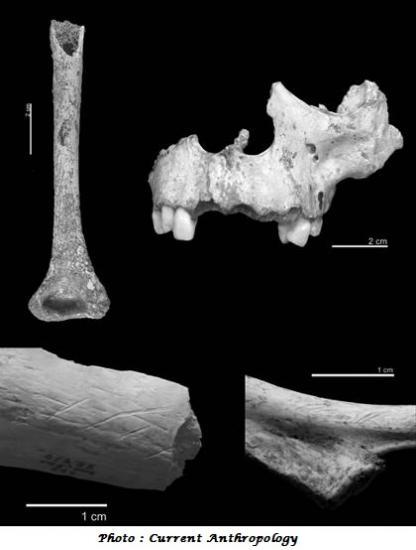Cannibal cavemen of Spain uncovered
Dan Vergano
Source : http://content.usatoday.com/communities/sciencefair/post/2010/08/cannibal-cavemen-spain-nutrition/1
Our prehuman ancestors cannibalized one another for the "nutritional value" starting about a million years ago, finds an analysis of bones left in a Spanish cave.
In the journal Current Anthropology, a team led by archaeologist Eudald Carbonell of Spain's University of Rovira and Virgili, report fossil evidence of continuous cannibalism - cut marks and butchering remains - as a way of life among the Homo antecessor inhabitants of the Atapuerca Mountains archeological site.
From a sample of some 1,039 bones that included mammoths, buffalo, cats and other butchered species found in the cave level deposited more than 800,000 years ago, there also emerged 159 bones from 11 H. antecessor individuals, they report:

"Cut marks (slicing, chop, and scraping marks) on the cranial segment are abundant on the base of the temporal bones, face, and zygomatic bones: segments with a large amount of muscular attachments and ligaments. Cut marks found on the face indicate skinning and defleshing activities. Cranial fragments also display abundant evidence of breakage (percussion pits and adhered flakes) mainly located on the lower part of the cranium. The majority of zygomatic bones are broken in a similar manner to those documented in Native American cannibalized remains and Neolithic (post 9500 BC) individuals," says the study.
Modern humans did not arrive in Spain until around 30,000 years ago. An "archaic" human species, H. Antecessor possessed a brain about two-thirds the size of modern humans. They are thought to be ancestral to both modern humans and our Neanderthal cousins, who disappeared from the fossil record about the time of the first modern-looking humans in Europe.
The cannibalized bones from the Spanish site, tossed in with the bones of animals butchered for food, suggest that cannibalism was just another dietary option for these early cavemen, one with neither symbolic meaning or pursued solely as a survival strategy during famine.
Instead, the study authors suggest they "added cannibalism to their set of survival strategies as a way of competing with other human groups for available resources. This practice, accepted and included in their social system, is the oldest example of cultural cannibalism known to date. "